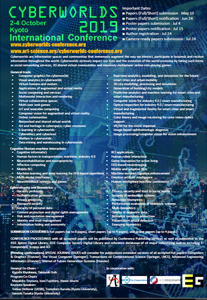Call for Papers
Cyberworlds are information spaces and communities that immensely augment the way we interact, participate in business and receive information throughout the world. Cyberworlds seriously impact our lives and the evolution of the world economy by taking such forms as social networking services, 3D shared virtual communities and massively multiplayer online role-playing games.
SUBMISSION CATEGORIES: full papers (up to 8 pages), short papers (up to 4 pages), and poster papers (up to 4 pages)
General track:
- Computer graphics for cyberworlds
- Visual analytics in cyberworlds
- Virtual humans and avatars
- Applications of augmented and virtual reality
- Social computing and services
- Multimodal interaction and rendering
- Virtual collaborative spaces
- Multi-user web games
- IoT and wearable computing
- Computer vision for augmented and virtual reality
- Online communities
- Networked and shared virtual worlds
- Art and heritage in cyberspace, cyber-museums
- E-learning in cyberworlds
- Cyberethics and cyberlaws
- Welfare in cyberworlds
- Data mining and warehousing in cyberworlds
- Real-time analytics, modelling, and simulation for the future smart cities and urban mobility
- 3D city modelling, processing and simulation
- Generation of building/city models
- Predictive analytics and machine learning for smart cities and smart manufacturing
- Computer vision for industry 4.0 / smart manufacturing
- Optical inspection for industry 4.0 / smart manufacturing
- Virtual and Augmented Reality for smart cities and smart manufacturing
- Color theory and image recoloring for color vision defect support
- VR/AR for the vision impaired
- Image-based ophthalmologic diagnosis
- Image processing/computer vision for vision enhancement
Cognitive Human-machine Interaction:
- Cognitive informatics
- Human factors in transportation, maritime, industry 4.0
- Neurorehabilitation and neuroplasticity
- Affective computing
- Mobile BCI
- Signal Processing
- Machine learning and deep learning for EEG-based algorithms
- Multi-modal Interfaces
- Neurofeedback systems and games
- BCI applications
- Human-robot interaction
- Game innovation for active living
- EEG-based neuroimaging
- Mobile and adaptive BCIs
- Machine-assisted cognitive enhancement
- Emotion artificial intelligence
- Human intelligence machine coexistence
Cybersecurity and Biometrics:
- Security protocols
- Authentication protocols
- Privacy protocols
- Password security
- Security of personal data
- Content protection and digital rights management
- Risk and reputation management
- Identity and trust management
- Information hiding and anonymity
- Privacy, security and trust in social media
- Security of embedded systems
- Behavioral biometrics
- Performance evaluation of biometric systems
- Multi-biometrics
- Quality of biometric data
- Biometric template protection
- Presentation attack detection
- Emerging biometrics
Important Date:
- Papers (Full/Short) submission :
May 31 (UTC)Jun 3 (UTC)(Extended due to the problems with EasyChair submission server on 30-31 May) - Papers (Full/Short) notification :
Jun 24Jul 1 - Poster papers submission :
Jul 4Jul 6 - Poster papers notification : Jul 15
- Author registration : Jul 24
- Camera-ready papers submission : Jul 24
PAPER SUBMISSION
Submission categories include full paper (up to 8 pages), short paper (up to 4 pages), poster paper (up to 4 pages with publication in the proceeding) and poster only (1 page without publication in the proceedings). Please note the different deadlines for the different submission categories. The papers must be written in good English, carefully proofread, and formatted to 8.5×11, 2-column following instructions in PDF | Word DOC | LaTeX.
Reviewing is double-blind. This means that the reviewers of the paper won’t get to know the identity of the author(s), and the author(s) won’t get to know the identity of the reviewer.The authors need to ensure that their manuscripts are prepared in a way that does not give away their identity. Please follow these guidelines while preparing and submitting your paper:
- Remove any identifying information, including author names, from the paper title as well as all the file names and document properties.
- Write your papers in the third person to refer to work which was previously undertaken by you, e.g., replace any phrases like “as we have shown before” with “it has been shown before”.
- Make surethe figures and figure captions do not contain any affiliation revealing your identity.
- Limit self-references only to papers that are relevant for those reviewing the submitted paper.
- ACite your own papers as follows: ‘[Anonymous, 2010]’ while in the reference list write, e.g., ‘[Anonymous 2010] Details omitted for double-blind reviewing.’
- Remove all references to funding sources.
- Do not include acknowledgments.
Your paper will be assigned to at least three reviewers for technical evaluation.
By submitting a paper the authors confirm that their paper represents original previously unpublished work, and that if accepted, at least one of the authors will register for the conference and present the paper/poster.
The accepted poster papers will require a 1 min fast-forward oral presentation by the presenting authors who also have to display and present during the poster session a printed poster (A0 size). The poster authors are also encouraged to set up demos of their works.
The accepted full/short/poster papers will compete for the Best Paper/Poster Award.
Paper submissions have to be made at the CW2019 submission web site.
PUBLICATION
By submitting a paper the authors confirm that their paper represents original previously unpublished work, and that if accepted, at least one of the authors will register for the conference and present the paper/poster.
The papers, which are registered but not presented at the conference, will not be included in the IEEE Xplore Digital Library -- this is the requirement of the publisher.
CONFERENCE PROCEEDINGS with all accepted papers will be published by Conference Publishing Services as well as submitted to the IEEE Xplore Digital Library, IEEE Computer Society Digital Library and reference databases of all major referencing indices including EI Compendex, Scopus and SCI
(Pending confirmation) SPECIAL JOURNAL ISSUES SPECIAL JOURNAL ISSUES will consider for publications extended versions of all accepted full papers: Computers & Graphics (Elsevier); The Visual Computer (Springer); Transactions on Computational Science (Springer, LNCS); Advanced Engineering Informatics (Elsevier); Journal of Future Generation Systems (Elsevier)

